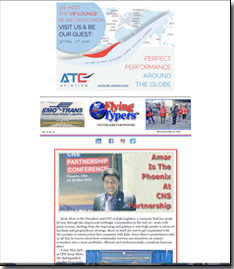
 |
| |
 |
 #INTHEAIREVERYWHERE |
| Vol. 21 No. 25 | Thursday
June 16,
2022 |
| |
Logistics payments and data infrastructure platform PayCargo has announced a new investment of up to $130M from funds managed by Blackstone Growth (BXG). BXG’s investment will support the company’s continued expansion both domestically and internationally, development of new products, as well as potential growth opportunities through M&A. “PayCargo is a category leader, operating at the intersection of several of our highest-conviction investment themes – including the continued proliferation of electronic payments, the digitization of the supply chain, and the modernization of business-to-business payments,” said Vincent Letteri, Senior Managing Director and Head of Financial Services for Blackstone Growth. “We believe that these attractive tailwinds, combined with the strength of PayCargo’s offering, positions the company well for its next phase of growth.” Blackstone, through its private equity, infrastructure, and real estate businesses, has invested significantly in the broader logistics, supply chain, and e-commerce space, including acquiring a leading port operator in North America and over 1.1M sq ft of warehouse assets globally. “Our partnership with Blackstone plays an important role in furthering our commitment to transforming the movement of goods and fostering increased efficiencies through PayCargo’s payment platform. Like Blackstone, we share the same mission and vision – serving the needs of our customers by building the largest independent freight payments network. Blackstone’s experience in the logistics, supply chain, and e-commerce space, will be invaluable for PayCargo as we continue to expand globally,” said Eduardo Del Riego, PayCargo CEO. PayCargo’s cloud-based payments network enables payers to quickly and securely pay air and ocean carriers, maritime ports, ground handlers, freight forwarders, and customs brokers, among others. PayCargo integrates with over 50 leading Transportation Management Systems (TMS), Enterprise Resource Planning (ERP), and Terminal Operating Systems (TMS) entities across various transport modes: Ocean, Air, Rail, and Trucking. Today, PayCargo’s network of more than 40K businesses is the leading independent payment platform focused on expediting the movement of cargo in North America and is rapidly expanding in Europe and other regions. Profitable since an early stage, PayCargo continues to invest to support this hyper-growth. PayCargo’s innovative new tools include advanced real-time customer reporting and invoicing, new workflow tools to streamline partial payments and reconciliation, advance payments, and automated refunds in any currency. SKA |
On Bedford Street in Manhattan is a wonderful ancient passage that runs for some blocks parallel to Hudson Street. There is a beautiful wooden frame home on Bedford Street right down the block from Chumley’s, a great writer's saloon and at one time a stop on the Underground Railroad that until the end of the U.S. Civil War worked to free slaves. At one point Bedford passes by Public School Three (PS 3) where etched in stone are the words “ Childhood Shows The Man", from the 17th century poet John Milton. As schooIs in New York City are emptying out for Summer 2022, I have been thinking, as have many parents about children, and watching with great interest a unique and earnest effort for children by Guillaume Halleux, Qatar Airways Chief Officer Cargo: “Children are the future generation and we hope that they bloom and develop their full potential. “Not all children are born with the same opportunities, but every child has the right to dream. “To make their dreams a reality, Qatar Airways Cargo wants to gather forces to support this next generation in need, by sending them toys, educational materials, and sports items so that all children can enjoy their childhood," Guillaume declared. When Qatar Airways Cargo delivered the third in its groundbreaking WeQare sustainability campaign branded “ Let's Stand Together”, an idea of seeking donations for children that focused on education, sports and fun may have seemed a simple enough goal, but in this often glum, hard bitten year of continued COVID and War, we thought, well why not? So the call “Let’s Stand Together” for children went out and Qatar Cargo set its system to collect donations with each station featuring its own collection point. At home Qatar Airways Cargo opened six donation collection points for its employees as well. So what did they ask for and get? WeQare collected study material (books, school bags, pencils), clothes and sports items (socks, soccer balls, sneakers, jerseys) as well as toys, musical instruments, and board games from around the world and then redistributed them globally as well. The Beach Boys song “Surf's Up” by Brian Wilson & Van Dyke Parks sums it all up: “A children's song “Have you listened as they played? “Their song is love, “And the children know the way!” Bravo Qatar Cargo! GDA |
 |
FT:
What about Russia? |
Need more proof that COVID is still out there? Although in some cases people are reluctant to come right out and say “I have COVID” we are getting reports from attendees of Cargo Network Services Corp. (CNS) held in Phoenix May 23-25 and also Air Cargo India Mumbai May 31-June 2, by people, who after flying home, a few days later are coming up sick, bitten by the pandemic despite being vaccinated several times . . . We note that in all the pictures from both Phoenix and Mumbai, almost no one was wearing a mask. That is not only just plain not thought through, the consequences can also be life threatening. What is particularly distressing here is the irrational reluctance by some to the wearing of a K95 or better mask as safeguard. Ahead at the airport level all over the world are monthly cargo club meetings although that action lessens a bit during summer. Also ahead on the calendar in 2022 is International Air Transport Association (IATA)’s World Cargo Symposium during September in London and The International Air Cargo Association TIACA’s Air Cargo Forum in Miami during October and The FIATA International Federation of Freight Forwarders Associations World Congress for 2022 is scheduled for September 14 in Busan, Korea. The Washington Post reports that “the Biden administration is warning the United States could see 100 million coronavirus infections and a potentially significant wave of deaths this fall and winter, driven by new omicron subvariants that have shown a remarkable ability to escape immunity.” People don’t like to talk about it and for air cargo events there is no central clearing house. But, up and down the line, people are still contracting the disease. The rub for nearly everyone are the mandates. Perhaps if people decided that wearing a mask Is an act of self-defense . . . Masks work and worn correctly can save you a nasty couple days of a really big hurt with lingering impact that can continue for some time. What you will discover with COVID is that you cannot be reckless around it. With COVID there is nowhere to run, nowhere to hide. GDA |
 |
If
You Missed Any Of The Previous 3 Issues Of FlyingTypers Access complete issue by clicking on issue icon or Access specific articles by clicking on article title |
||
 Vol. 21 No. 22 Amar Is The Phoenix At CNS Chuckles for May 25, 2022 Memorial Day 2022 |
|
|
Publisher-Geoffrey Arend
• Managing Editor-Flossie Arend • Editor Emeritus-Richard
Malkin Film Editor-Ralph Arend • Special Assignments-Sabiha Arend, Emily Arend |
Send comments and news to geoffrey@aircargonews.com
|